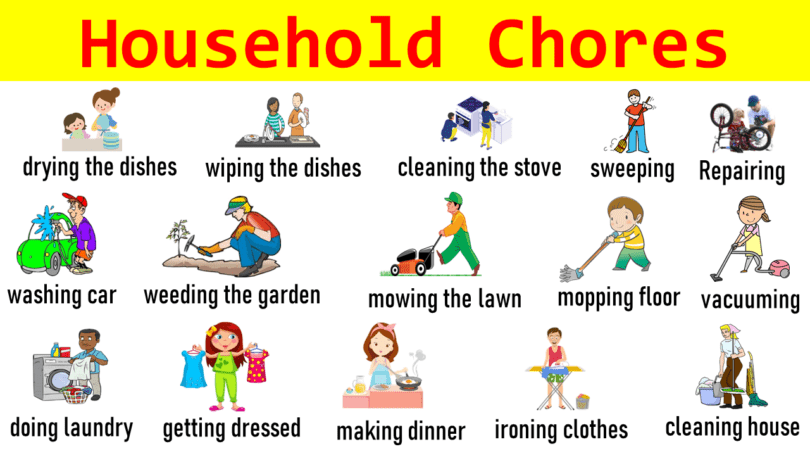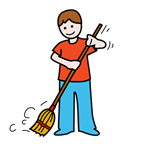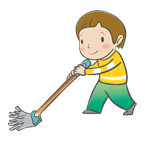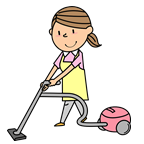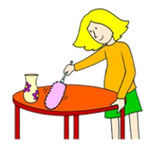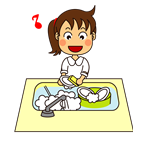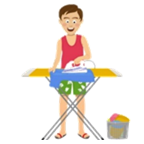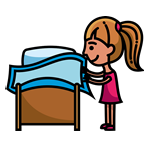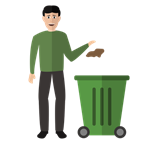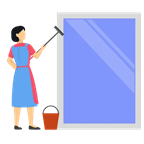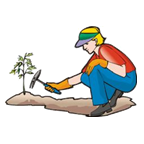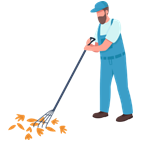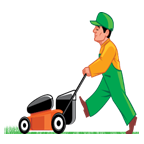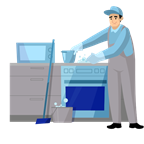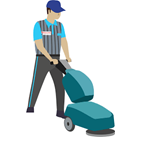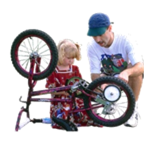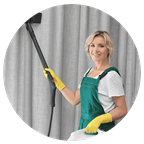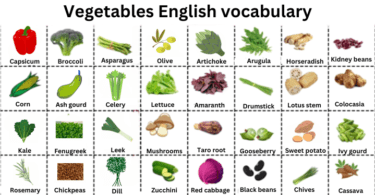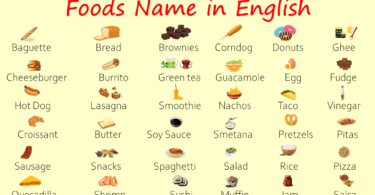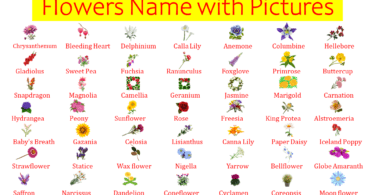Understanding household chores vocabulary is essential for effective communication and organization at home. Whether assigning tasks, creating chore charts, or maintaining order, knowing the right terms simplifies daily routines. This post provides a clear list of common household chores, from washing dishes to mowing the lawn, helping you navigate tasks with confidence. Let’s discuss these essential words to keep our homes running smoothly!

House Chores Vocabulary
List of House Chores with Description
| Task | Description |
|---|---|
| Making the Bed | Straightening and tidying up the bedding to start the day with an organized space. |
| Brushing Teeth | Cleaning your teeth with a toothbrush and toothpaste for oral hygiene. |
| Taking a Shower | Cleansing your body with water and soap to stay fresh and clean. |
| Getting Dressed | Choosing and putting on appropriate clothing for the day. |
| Preparing Breakfast | Making and eating the first meal of the day to fuel your body. |
| Washing Dishes | Cleaning and putting away dishes and utensils used during meals. |
| Sweeping/Vacuuming | Removing dust and dirt from floors using a broom or vacuum cleaner. |
| Taking Out the Trash | Emptying waste bins and disposing of garbage properly. |
| Doing Laundry | Washing, drying, and folding clothes to maintain a clean wardrobe. |
| Cooking Meals | Preparing lunch and dinner, ensuring your family is well-fed. |
| Feeding Pets | Providing food and water to your pets for their well-being. |
| Watering Plants | Giving your indoor and outdoor plants the hydration they need. |
| Grocery Shopping | Purchasing food and household essentials from the store. |
| Paying Bills | Managing household finances by settling utility bills and rent or mortgage payments. |
| Cleaning the Bathroom | Scrubbing and sanitizing sinks, toilets, and showers. |
| Mowing the Lawn | Trimming the grass in your yard to maintain its appearance. |
| Taking Care of Children | Looking after the needs and well-being of kids, including feeding, bathing, and playing with them. |
| Checking Emails | Managing your inbox, responding to messages, and staying organized. |
| Exercising | Engaging in physical activity to promote fitness and health. |
| Reading | Devoting time to read for relaxation or learning. |
| Organizing Closets | Keeping your clothing and belongings neatly arranged. |
| Dusting Furniture | Removing dust and allergens from surfaces like tables and shelves. |
| Emptying the Dishwasher | Unloading clean dishes and utensils to make them ready for use. |
| Ironing Clothes | Straightening out wrinkles in clothing using an iron. |
| Taking Medications | Ensuring you take prescribed medicines at the right times. |
| Watering the Garden | Providing hydration to outdoor plants, flowers, and vegetables. |
| Emptying the Litter Box | Cleaning and changing the litter for pet cats. |
| Checking Mail | Collecting and sorting mail received in your mailbox. |
| Making To-Do Lists | Creating lists of tasks and priorities for the day. |
| Setting the Table | Arranging dishes, cutlery, and glassware for meals. |
| Emptying Trash in Car | Cleaning out waste from your vehicle. |
| Making Phone Calls | Communicating with friends, family, or colleagues as needed. |
| Checking Social Media | Scrolling through social networking sites to stay updated. |
| Taking a Walk | Engaging in a leisurely stroll for exercise and relaxation. |
| Washing Hands | Maintaining proper hand hygiene throughout the day. |
| Cleaning Refrigerator | Tossing expired items and wiping down shelves. |
| Flossing Teeth | Cleaning between teeth to maintain dental health. |
| Tidying Up Toys | Putting away children’s toys and games. |
| Shaving (for Men) | Grooming facial hair to stay well-kempt. |
| Applying Makeup (for Women) | Enhancing facial appearance with cosmetics. |
Types of Household Chores
Household chores can be categorized based on how often they need to be done and the area of the house they involve. Below are the main types:
1. Daily Chores
These are tasks that need to be done every day to maintain a clean and organized home.
- Making the bed
- Washing dishes
- Sweeping/vacuuming floors
- Taking out the trash
- Wiping kitchen counters
- Feeding pets
2. Weekly Chores
These tasks are done once or multiple times a week to keep the house tidy.
- Doing laundry
- Mopping floors
- Cleaning the bathroom (scrubbing sinks, toilets, and showers)
- Dusting furniture
- Grocery shopping
3. Monthly/Occasional Chores
These tasks don’t need daily or weekly attention but are essential for deep cleaning and home maintenance.
- Washing windows
- Cleaning the refrigerator
- Organizing closets
- Scrubbing the oven
- Decluttering storage areas
4. Seasonal Chores
Tasks that depend on the time of year and weather conditions.
- Raking leaves (fall)
- Clearing gutters (fall/winter)
- Deep cleaning carpets (spring/fall)
- Preparing outdoor furniture (summer)
- Shoveling snow (winter)
5. Outdoor Chores
Tasks that involve maintaining the outside of the house.
- Mowing the lawn
- Watering plants
- Taking out the garbage and recycling
- Trimming bushes and trees
- Sweeping patios or driveways
6. Kitchen Chores
Tasks specifically related to maintaining cleanliness in the kitchen.
- Washing dishes
- Cleaning kitchen counters and appliances
- Organizing the pantry
- Taking out food waste
- Scrubbing the stove and oven
7. Bathroom Chores
Cleaning and maintaining hygiene in the bathroom.
- Scrubbing toilets
- Cleaning sinks and mirrors
- Replacing towels and toiletries
- Wiping down shower doors and bathtubs
8. Chores for Kids
Simple, age-appropriate tasks children can help with.
- Picking up toys
- Setting the table
- Feeding pets
- Watering plants
- Putting away clothes
Common Phrases and Expressions Related to Chores
Using the right phrases when talking about household chores helps in giving instructions, making requests, and discussing responsibilities. Here are some useful expressions:
1. Talking About Doing Chores
- I need to do the laundry today.
- Let’s clean up the kitchen after dinner.
- It’s time to take out the trash.
- I have to vacuum the living room.
- Can you help me wash the dishes?
2. Asking Someone to Do Chores
- Could you please sweep the floor?
- Would you mind cleaning the bathroom?
- Don’t forget to water the plants.
- Can you take out the garbage before you go?
- It’s your turn to do the dishes tonight.
3. Complaining About Chores
- I’m so tired of doing laundry every day!
- Cleaning the bathroom is the worst chore!
- Why am I the only one who does the dishes?
- This house is a mess. We need to clean up!
- I wish someone else would vacuum for a change.
4. Offering to Help with Chores
- Do you need help with the laundry?
- I can wash the dishes if you want.
- Let me take care of the vacuuming today.
- I’ll set the table while you cook.
- I don’t mind sweeping the floor.
5. Dividing Household Chores
- Let’s make a chore schedule so everyone helps.
- I’ll cook dinner if you wash the dishes.
- Can we split the cleaning this weekend?
- You do the laundry, and I’ll clean the kitchen.
- Each person should be responsible for their own room.
FAQs on Household Chores Vocabulary
1. Why is it important to learn household chores vocabulary?
Knowing the right terms helps in assigning tasks, creating chore charts, and communicating effectively about household responsibilities.
Discover how Captionstime helps create engaging captions. Elevate your posts with words that catch attention and spark interest. Perfect captions make sharing moments even more special.
2. How can learning chore-related words make daily routines easier?
A clear understanding of household tasks ensures better organization, reduces confusion, and helps streamline daily responsibilities.
3. What are some common household chores?
Tasks like washing dishes, vacuuming, taking out the trash, doing laundry, and mowing the lawn are common household chores.
4. How can I teach kids household chores vocabulary?
Using chore charts, visuals, and simple explanations can help children learn and understand household task names easily.
5. How can I remember and use household chores vocabulary effectively?
Practicing the terms in daily conversations, making to-do lists, and using chore-related apps can reinforce learning.
You May Also Like

